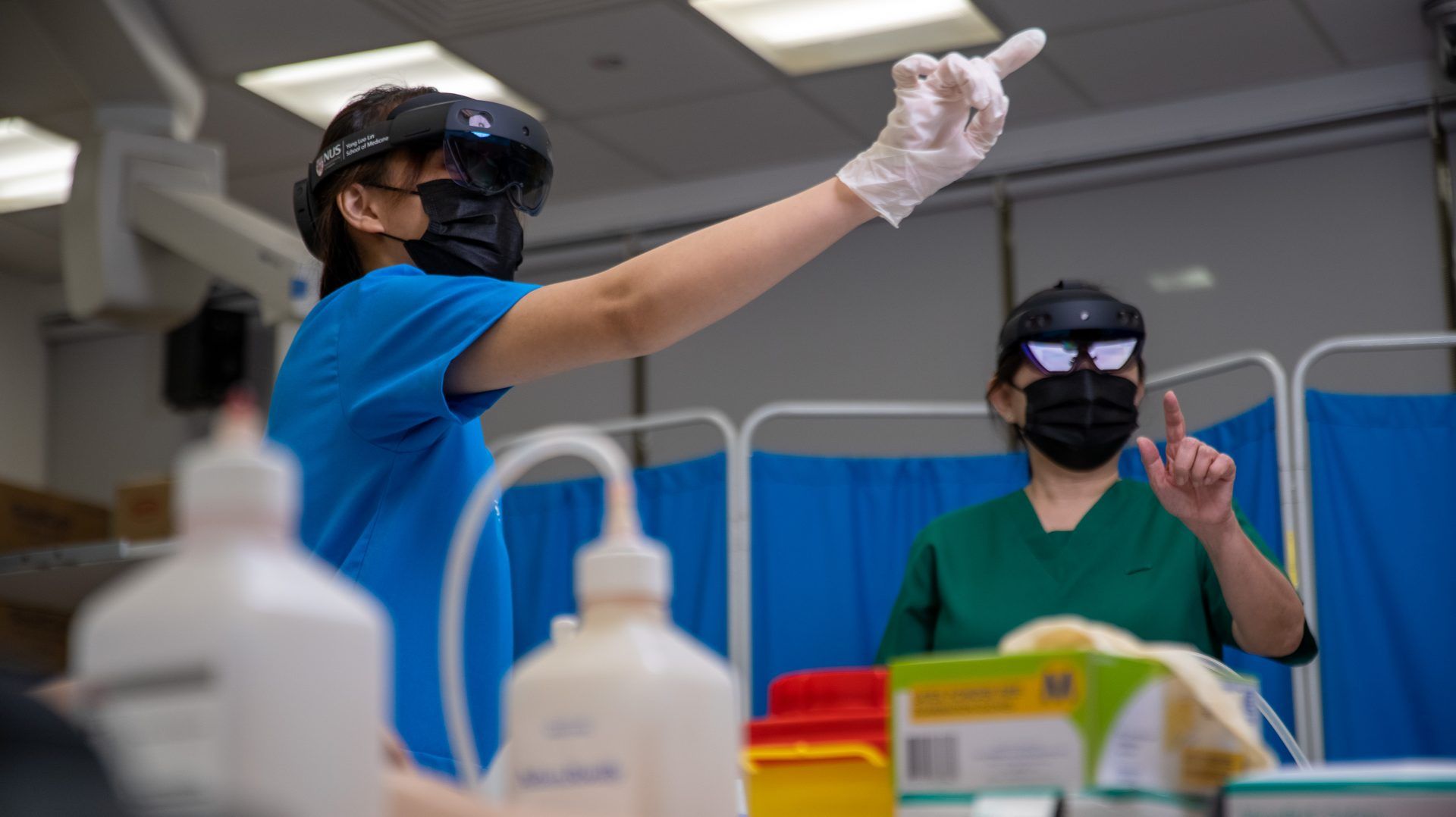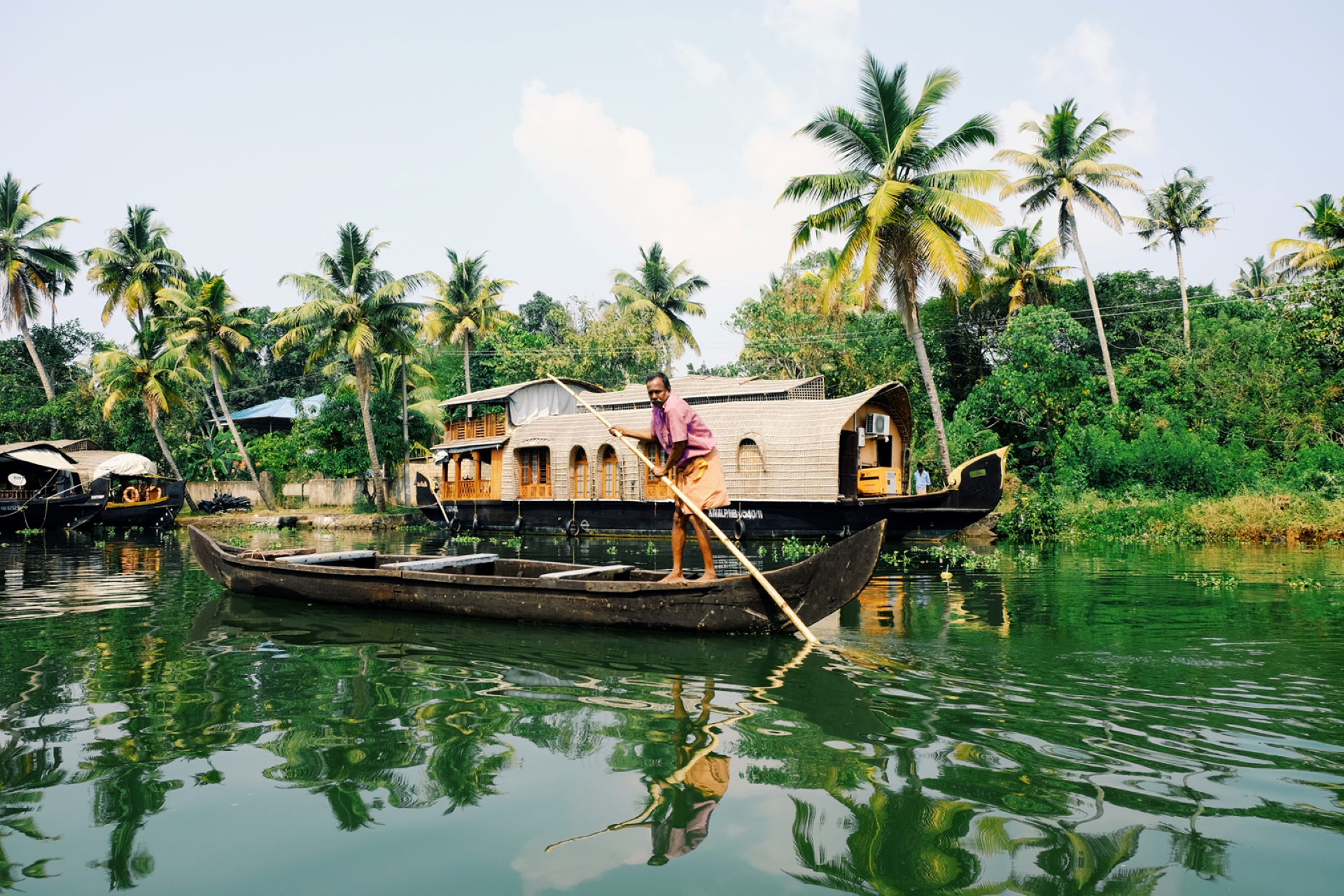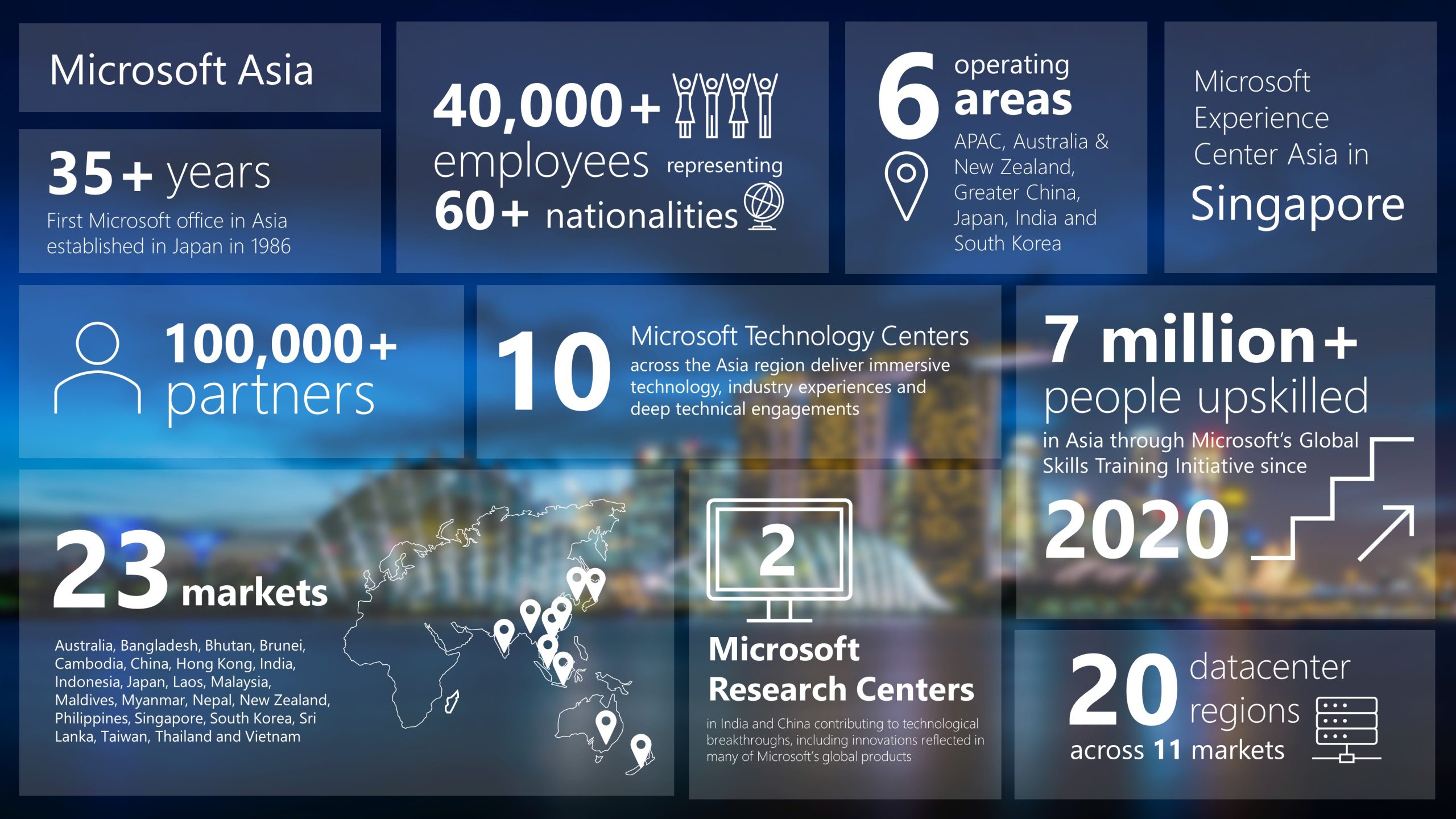
Microsoft in Asia: Empowering a new global innovation engine that is transforming economies and societies
For decades, Asia was viewed as the world’s factory. Not anymore.
Low-value “Made in Asia” exports are being overtaken by high-value “Born in Asia” creativity, originality, and knowledge. This has made the region a new global powerhouse of innovation that could generate around half the world’s GDP by 2050 and account for more than half of all R&D investments by 2030.
A new and increasingly affluent generation of confident, tech-savvy entrepreneurs, workers, and consumers are driving world-changing ideas, products, services, and solutions across the region and going global.
This unprecedented wave of opportunity is also transforming the lives of millions of people in Asia who are now looking forward to a safe, prosperous, and sustainable future for their families, communities, and the places where they live and work.
The economic prospects certainly look bright, but Asia’s overall long-term success also depends on its ability to advance socially in diverse, inclusive, and sustainable ways. There is much to be done to address long-standing inequalities and to bridge the digital divide in the wake of the pandemic.
Asia has a good chance of meeting these challenges. Its energetic mix of optimism, technology, entrepreneurship and open regulatory environments has the potential to drive both inclusive economic growth and societal progress.
 This is where Microsoft fits in. Our global mission is to empower every person and every organization on the planet to achieve more. And we are fulfilling this mission in Asia as a trusted ally dedicated to empowering the region as an engine of innovation to drive societal progress.
This is where Microsoft fits in. Our global mission is to empower every person and every organization on the planet to achieve more. And we are fulfilling this mission in Asia as a trusted ally dedicated to empowering the region as an engine of innovation to drive societal progress.
We have been operating in the region for more than three decades and have a presence in 23 Asian markets today. Our diverse and talented team of some 30,000 people – across sales, marketing, operations, engineering, and developers – serve customers through a market-leading ecosystem of more than 100,000 partners. And, as proof of our commitment to Asia’s future, we have established our two largest research centers outside the United States in China and India.
Through our tenure, Microsoft has become a go-to partner for Asia’s businesses, governments, partners, communities, and individuals. We succeed when they succeed – and so, we work with, rather than compete with, them.
Our secure, reliable, open, and compliant platform and technology suite of cloud, data, AI, productivity, and security solutions help to drive the region’s transformational journey.
We are committed to building trust at all levels. That is why we focus on strengthening privacy protection, countering cybersecurity threats, and ensuring AI is used responsibly.
Similarly, we embrace the value of inclusiveness and diversity. That is why we are investing in major initiatives with governments and the private sector to upskill the workforce of today and foster the next generation of leaders and technologists, so the benefits of Asia’s transformation can be shared by all.
We are proud to be part of this next exciting chapter to accelerate the potential of Asia and are working in partnership to empower the region’s people and bring Asian innovation to the world.
Building digital Infrastructure
We are partnering with governments to provide digital infrastructure that improves citizens’ lives and creates new economic opportunities.
We are constantly expanding our regional cloud infrastructure to underpin innovation, stimulate economic activity and lay the foundations for business resilience with 20 datacenter regions across 11 markets. In India alone, our datacenter regions have added 1.5 million jobs to the economy over five years, including 169,000 new skilled IT positions.
Our datacenter investments go beyond technology infrastructure. For example, regional expansion in Malaysia, Indonesia and Taiwan are set to generate more than US$21 billion in new revenues and create 100,000 new jobs by 2025.
Empowering the ambition of Startups
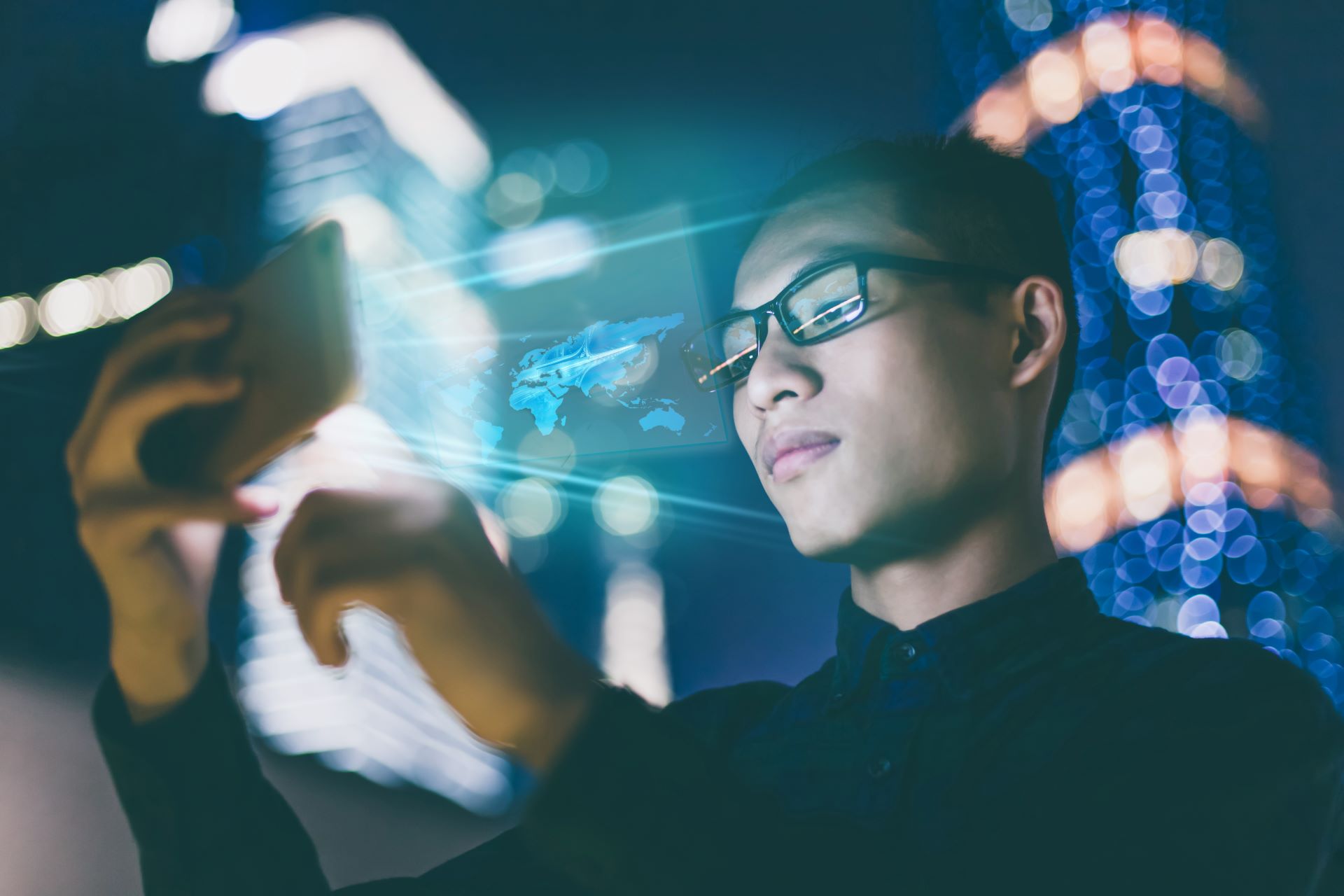 Asia has the world’s largest and youngest cohort of ‘digital natives’ – a new generation of consumers who are mobile-first, constantly online, social media savvy and comfortable with e-commerce and electronic payments. Technology is in their DNA.
Asia has the world’s largest and youngest cohort of ‘digital natives’ – a new generation of consumers who are mobile-first, constantly online, social media savvy and comfortable with e-commerce and electronic payments. Technology is in their DNA.
In response, we are seeing Asia emerge as the Startup hub of the world. CB Insights reports that Asia was the #1 region for global venture deals in 2021 – with China, India and South Korea among the top 10 countries where unicorns are created at unprecedented speed. These Startups are uniquely placed to solve some of the region’s greatest challenges from financial inclusion to access to healthcare to building sustainable practices. Many are tapping into Microsoft’s cloud, data, AI, productivity and security solutions to scale up and reach new markets, not just in Asia, but also across the world.
Indonesian startup Bukalapak has helped bring millions of tiny stores online, allowing small businesses to offer a whole range of services with no investment required other than a smartphone.
HolyWally a digital wallet solution from Singapore has democratized the ability of its customers, including EastWest Bank in the Philippines, to create digital wallets and promote greater financial inclusion across markets.
In Korea, Lunit uses heat mapping to detect lung symptoms that can be related to COVID-19. It flags the vital details that even seasoned radiologists might miss when under pressure.
And in China, robotics company FJ Dynamics is turning traditional farming on its head with the power of data. Its efficient and secure Internet the Things (IoT) platform boosts production and sustainability while reducing risk of labor shortages and the physical demands on farmers.
Through initiatives like the Microsoft for Startups Founders Hub in Asia, our She Loves Tech partnership and our Project Amplify collaboration with Accenture, we are doubling down on our support and becoming the cloud platform of choice for the region’s startups.
Driving digital transformation
We partner with enterprises, conglomerates and organizations of all kinds and across industries that want to transform business models, boost agility, increase competitiveness, reduce costs, improve customer experiences and even create new industries.
At Singapore’s NUS Yong Loo Lin School of Medicine, medical and nursing students are using Microsoft HoloLens2 to learn medical procedures and study anatomical structures in a more efficient and compelling way.
In financial services, we witnessed next-generation payments and banking-as-a-service become a reality when traditional financial institutions, such as Westpac in Australia, digitized and became future-ready banks.
In manufacturing, Toyota is using mixed-reality with Microsoft HoloLens2 to improve repair quality, provide innovative training for technicians, and better customer service.
Retailers, like Myntra in India and supermarket giant Coles in Australia, are embracing cloud solutions to transform customer experiences and enhance workplace systems.
And in Sri Lanka, a cloud-based tea auction system has kept buyers and sellers socially distanced through the pandemic – transforming a 150-year-old industry and protecting the livelihoods of almost two million people.
Safeguarding Asia’s trust in technology
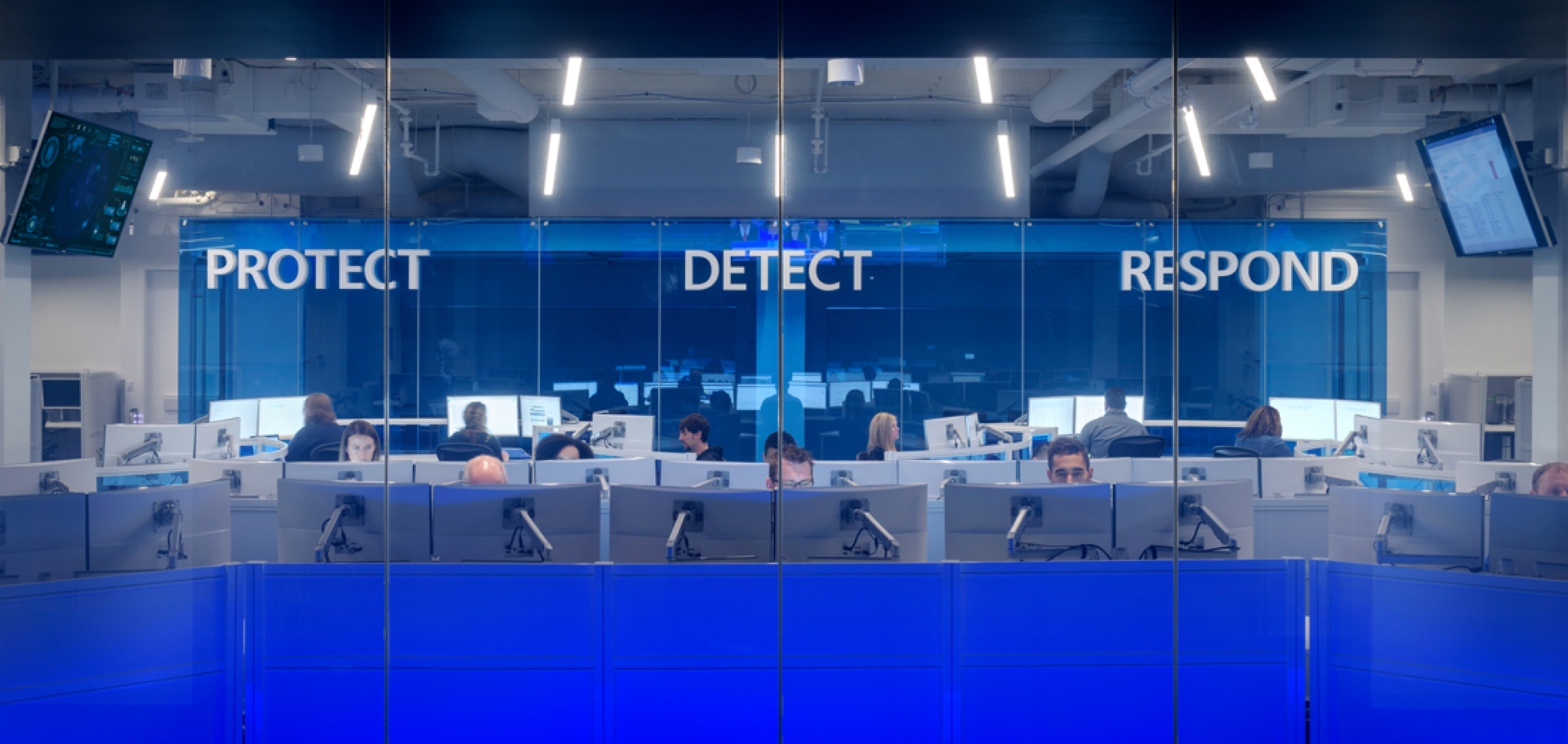 At Microsoft, we understand that technology is only powerful when people trust it. That is why we are constantly stepping up our safeguards on information privacy and security.
At Microsoft, we understand that technology is only powerful when people trust it. That is why we are constantly stepping up our safeguards on information privacy and security.
We are working with our partners in Asia to adopt proactive risk management measures, build cyber-resilient cultures and shape zero trust cybersecurity strategies.
Our Digital Crimes Unit is fighting cybercrime with the latest technologies. We’ve gathered together an Asia Pacific Public Sector Cyber Security Executive Council of policy, technology, and industry leaders to address cyberthreats and share security best practices.
Microsoft is committed to democratizing access to useful, anonymized open data, with 20 collaborations built around shared data. We are also implementing the General Data Protection Regulation on a global scale as we establish guardrails for AI systems to mitigate risks and maximize benefits.
We believe that more diverse teams are stronger teams. Because of this, we are helping to close Asia’s cybersecurity skills gap through upskilling programs and better educational and hiring opportunities across underserved social groups and minorities in the region.
For example in India, our CyberShikshaa program is breaking down traditional gender divides by providing young women with cybersecurity technical training and mentoring from industry experts, including women leaders.
Sustainable Asia
Sustainability is key to Asia’s hopes of long-term growth and prosperity.
We are committed to becoming a carbon negative, water positive, and zero waste company globally by 2030. We are also advancing sustainability-related technology innovations in Asia so our customers and partners can change along with us, stride by stride.
For example, we are supporting the Pacific Community with its launch of a pioneering analytics platform called Digital Earth Pacific that is built on our Planetary Computer. With data-based insights, Pacific Island states can make informed decisions related to climate change, food security and natural disasters.
In Indonesia, our cloud and AI solutions are enabling Jejak.in to accelerate decarbonization by collecting, processing, and analyzing environmental information from numerous data sources, including drones and IoT sensors. And in India, we have partnered with startup SUN Mobility to develop a cloud-based battery system for eco-friendly electric tuk-tuks that will help clear the air in congested cities.
Modernizing the workforce in Asia
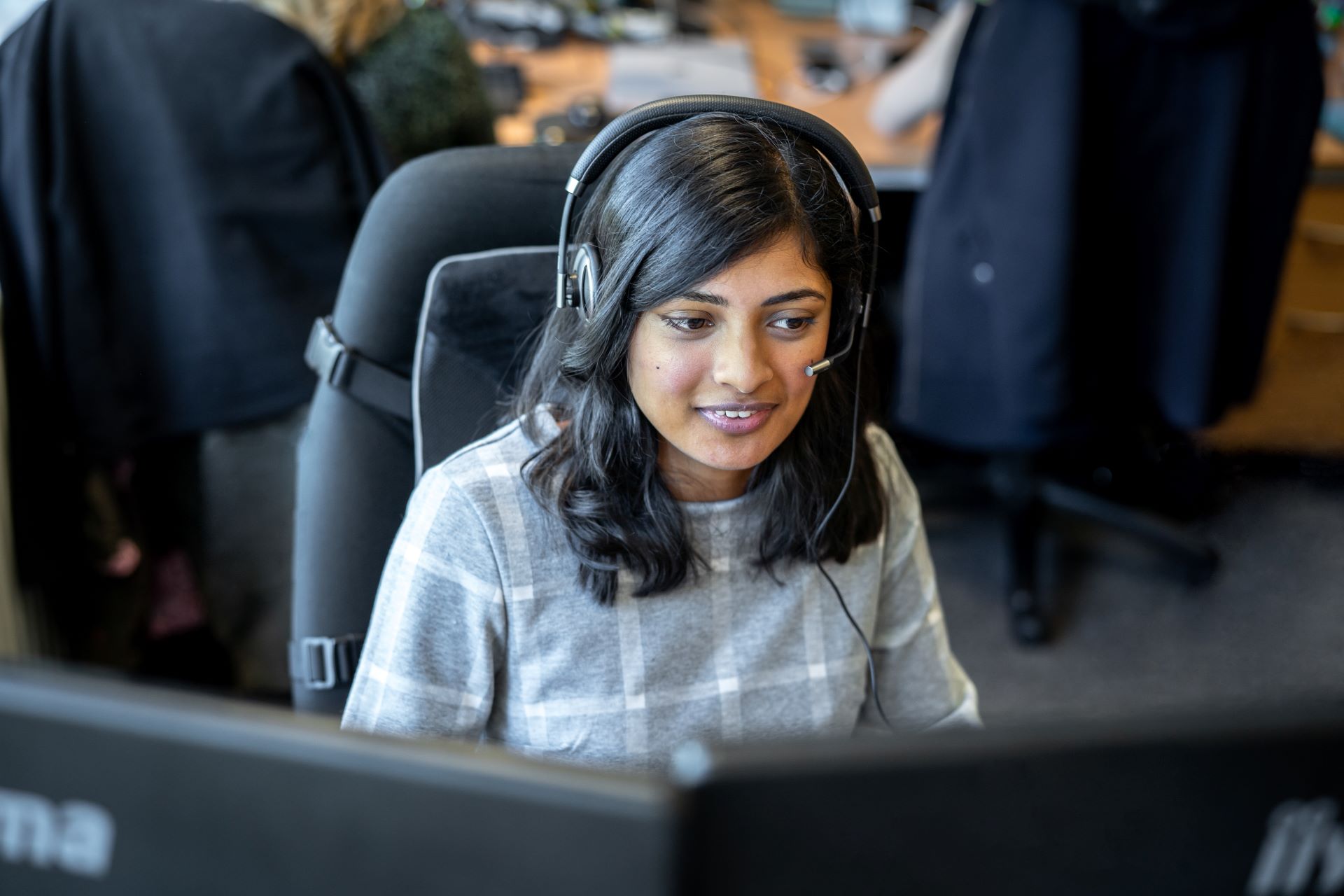 To help equip the workforce – from our customers and partners to our own employees – we are bringing together our collective experience to navigate the new ways of working in a modern, hybrid world.
To help equip the workforce – from our customers and partners to our own employees – we are bringing together our collective experience to navigate the new ways of working in a modern, hybrid world.
Our research shows us that employees now have a “worth it” equation, that their organizations need to make the office worth the commute. We also know that employees are more likely to prioritize health and wellbeing than before the pandemic.
Flexible work does not have to mean “always on.” The increasing usage of productivity tools like Viva, Microsoft 365 and Windows 11, along with the climb we have seen in the use of Teams chats and an increase in workday and weekend work demonstrates the need for balance.
Rebuilding social capital looks different in our hybrid world. And relationship-building is the greatest challenge for hybrid or remote work models.
Our ability to build a flexible, yet productive, environment – that is inclusive, focuses on wellness and is grounded in trust – is critical for both employees and employers as Asia powers ahead.
For businesses to succeed, workers need to acquire digital skills. From June 2020 to March 2021 we helped upskill almost 6 million people across Asia through Microsoft’s Global Skills Training Initiative – despite the pandemic.
In China, we partnered with DDI to empower 1 million women with digital skills in 2021. In the same year, we trained 1 million students in AI skills in India through a nationwide initiative with NASSCOM FutureSkills.
We are also partnering with Parsol Innovation in Japan to invest 20,000 workers with digital skills by 2025, and we are working with Grab in Southeast Asia on skills training and digital literacy for drivers and delivery partners.
Across Asia, we are presenting our solutions in multiple regional and national languages. We are also designing inclusive technology while supporting women and other underserved groups. Our aim is to ensure everyone has equal access to technology.
Around 4.6 billion people live, study, work and play in Asia. And the reality of their individual experiences is as diverse and different as the region itself. We are relentless in our ambition to empower Asia as a new global innovation engine that is creating economic and societal progress.





